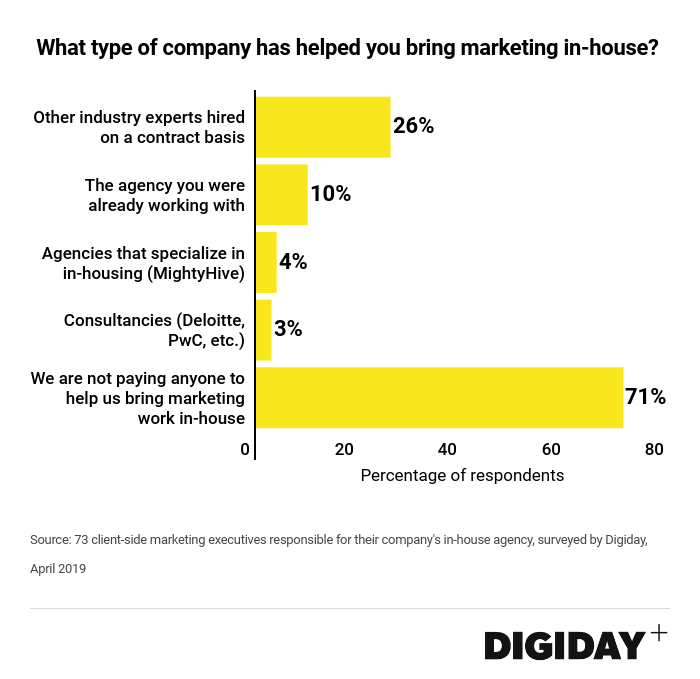Secure your place at the Digiday Publishing Summit in Vail, March 23-25
Digiday Research: Marketers aren’t relying on agencies to set up in-house operations.
This research is based on unique data collected from our proprietary audience of publisher, agency, brand and tech insiders. It’s available to Digiday+ members. More from the series →
Clients taking various marketing functions are finding there is no one right way to do it. They’re also choosing not to rely on outside help when developing their in-house marketing capabilities.
Of 73 client-side marketers with in-house agencies surveyed by Digiday this April, 71% said they do not use external help in the form of agencies, consulting firms or contract hires when creating in-house agencies.
While consultancies are attempting to cash in on marketers’ in-housing plans, few clients are taking them up on their offer. Just 3% of clients in the Digiday survey said they were working with consulting firms to take control of certain functions.
Instead, when outside help was needed, independent contractors, used by 26% of respondents, or existing agencies, used by 10%, were most likely to be called upon.

But building an in-house agency is no small feat. Leland Maschmeyer, chief creative officer at Chobani, said Chobani’s in-house agency came together faster than expected.
“The CEO and CMO supported it as an important company-wide priority and because we were able to re-allocate our agency fees straight to the in-house agency,” he said.
However, one challenge for clients hoping to build an in-house agency themselves is talent. While previous Digiday research found that agency workers believe in-house roles are safer, most would agree that they are less exciting.
“There’s a certain perception of in-house agencies,” said Maschmeyer. “With a wide variety of work and clients to pick from, it was challenging getting agency-side talent over the hurdle of choosing to work on just one client.”
More in Marketing

‘The conversation has shifted’: The CFO moved upstream. Now agencies have to as well
One interesting side effect of marketing coming under greater scrutiny in the boardroom: CFOs are working more closely with agencies than ever before.

Why one brand reimbursed $10,000 to customers who paid its ‘Trump Tariff Surcharge’ last year
Sexual wellness company Dame is one of the first brands to proactively return money tied to President Donald Trump’s now-invalidated tariffs.

WTF is Meta’s Manus tool?
Meta added a new agentic AI tool to its Ads Manager in February. Buyers have been cautiously probing its potential use cases.





